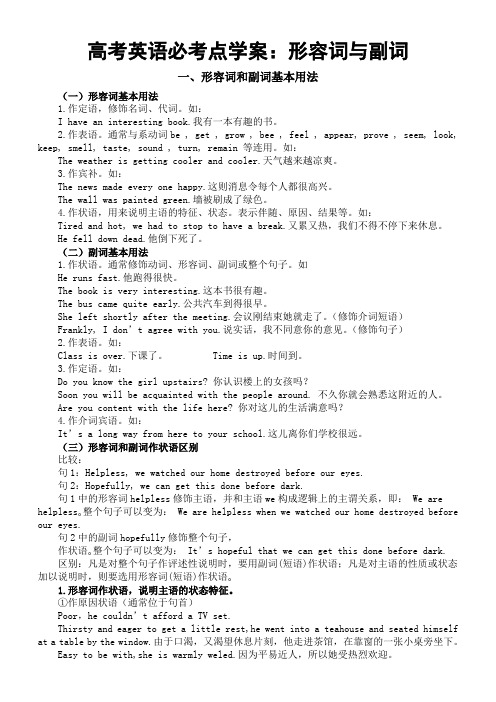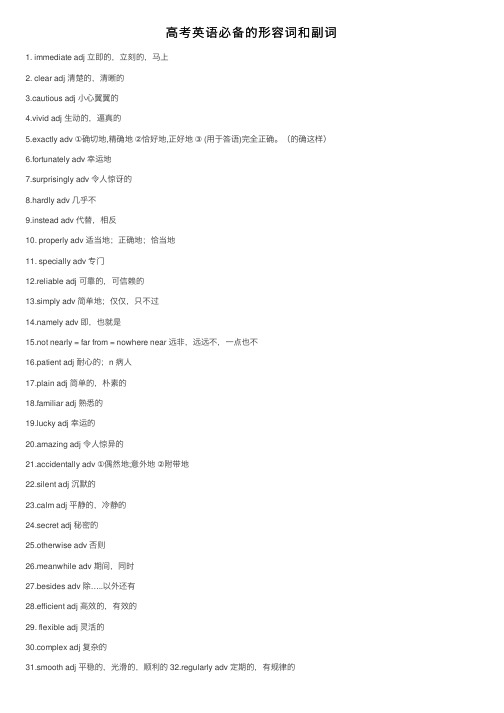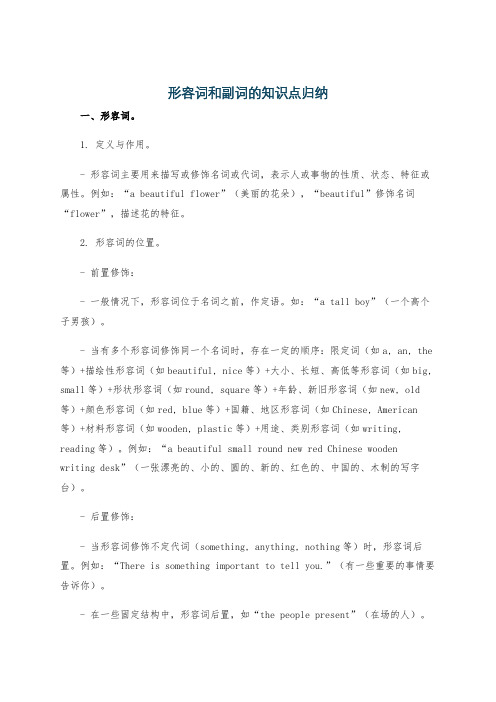最新高考英语重点语法形容词和副词
高考英语复习形容词和副词知识点讲解讲义(必考点)

高考英语必考点学案:形容词与副词一、形容词和副词基本用法(一)形容词基本用法1.作定语,修饰名词、代词。
如:I have an interesting book.我有一本有趣的书。
2.作表语。
通常与系动词be , get , grow , bee , feel , appear, prove , seem, look, keep, smell, taste, sound , turn, remain 等连用。
如:The weather is getting cooler and cooler.天气越来越凉爽。
3.作宾补。
如:The news made every one happy.这则消息令每个人都很高兴。
The wall was painted green.墙被刷成了绿色。
4.作状语,用来说明主语的特征、状态。
表示伴随、原因、结果等。
如:Tired and hot, we had to stop to have a break.又累又热,我们不得不停下来休息。
He fell down dead.他倒下死了。
(二)副词基本用法1.作状语。
通常修饰动词、形容词、副词或整个句子。
如He runs fast.他跑得很快。
The book is very interesting.这本书很有趣。
The bus came quite early.公共汽车到得很早。
She left shortly after the meeting.会议刚结束她就走了。
(修饰介词短语)Frankly, I don’t agree with you.说实话,我不同意你的意见。
(修饰句子)2.作表语。
如:Class is over.下课了。
Time is up.时间到。
3.作定语。
如:Do you know the girl upstairs? 你认识楼上的女孩吗?Soon you will be acquainted with the people around. 不久你就会熟悉这附近的人。
高中英语 高考总复习之形容词和副词

形容词(adj.)和副词(adv.)一、作用1.形容词名词前修饰名词系动词后注意:be动词(am is are was were)感官动词(feel look sound taste smell)常考系动词变得(get become turn )保持(stay keep)2.副词修饰动词放在句首二、形容词变副词的规则1. +ly2. 以辅音字母加y结尾,变y为i+ly3. true----truly probable----probably possible-----possibly comfortable-----comfortably注意:(1) 有些词既可作形容词也可作副词。
如:fast, early, late,hard,high 等。
(2)good 的副词是well !(切记)练习1、把下面形容词变成副词。
heavy ___________ slow _________ fast __________careful ___________ light __________ careless _____________busy ___________ sad __________ loud ____________natural ___________ successful ___________ late ___________good ___________ lucky ___________ early __________二、选词填空。
1,He is a ________ student, and he always does _______ at school. ( good / well ) 2. My father usually finishes his jobs ______________. He is a __________ man. ( successful / successfully)3. I am so ________ today. I won the match __________. ( lucky / luckily)4. Shanghai is a ________ city. Everyone works _________. (busy / busily )5. She sings really __________. ( good / well )6. Don’t drive too __________ ( fast ). It’s dangerous.7. Tim goes to school _________ every day. But it’s too ________ today. ( early)8. I am never _________ for school. But today I got to school too _________. ( late )9. Listen to teachers __________ in class. You should be __________.( careful / carefully)10, Tony is a __________ boy. He lost his bag ___________ this morning. ( careless / carelessly)三、用括号里所给词的正确行使填空。
高考英语必备的形容词和副词

⾼考英语必备的形容词和副词1. immediate adj ⽴即的,⽴刻的,马上2. clear adj 清楚的,清晰的3.cautious adj ⼩⼼翼翼的4.vivid adj ⽣动的,逼真的5.exactly adv ①确切地,精确地②恰好地,正好地③ (⽤于答语)完全正确。
(的确这样)6.fortunately adv 幸运地7.surprisingly adv 令⼈惊讶的8.hardly adv ⼏乎不9.instead adv 代替,相反10. properly adv 适当地;正确地;恰当地11. specially adv 专门12.reliable adj 可靠的,可信赖的13.simply adv 简单地;仅仅,只不过ly adv 即,也就是15.not nearly = far from = nowhere near 远⾮,远远不,⼀点也不16.patient adj 耐⼼的;n 病⼈17.plain adj 简单的,朴素的18.familiar adj 熟悉的19.lucky adj 幸运的20.amazing adj 令⼈惊异的21.accidentally adv ①偶然地;意外地②附带地22.silent adj 沉默的23.calm adj 平静的,冷静的24.secret adj 秘密的25.otherwise adv 否则26.meanwhile adv 期间,同时27.besides adv 除…..以外还有28.efficient adj ⾼效的,有效的29. flexible adj 灵活的plex adj 复杂的31.smooth adj 平稳的,光滑的,顺利的 32.regularly adv 定期的,有规律的33.sensitive adj 敏感的,体贴的34.honest adj 诚实的35.confident adj ⾃信的36.shy adj 害羞的,羞涩的37.thoughtful adj ①深思的,沉思的②富有思想的;经认真推敲的38.lighthearted and optimistic adj ⽆忧⽆虑⽽且⾮常乐观的39.nevertheless adj 然⽽40.private adj 私⼈的(private cars)41.personal adj 个⼈的(personal belongings)42.unique adj 唯⼀的,独⼀⽆⼆的;独特的43.favorable adj 赞同的,有利的44.precious adj 宝贵的,珍贵的45.essential adj 必要的,重要的46.worthwhile adj 值得的47.physical adj ⾝体的,物理的48.sudden adj 突然的49.merely adv 仅仅,只 =only50.rarely adv 罕见的51.splendidly adj 极好地,灿烂地52.increasingly adv 越来越多地53.naturally adv ⾃然地54.accurate adj 精确的,准确的55.ridiculous adj 可笑的,荒谬的56.urgent adj 紧急的,急迫的57.shallow adj 浅的,肤浅的58.frequently adv 经常地,频繁地59.especially adv 特别地,尤其地=particularly60.obviously adv 显⽽易见 =apparently61.necessarily adv 必要地,必须地,必然地62.generally adv ⼀般地,通常地63.eventually adv 最终,最后64.adoptable adv 可采⽤的,可收养的65.acceptable adj 可以接受的66.available adj 可利⽤的,可使⽤的,可得到的67.accessible adj 易接近的,易受影响的,可理解的68.relatively adv 相对地,⽐较地69.approximately adv⼤约70.absolutely adv 绝对正确地71.punctual adj 守时的72.gentle adj 温柔的73.neatly adv 整洁地74.entirely adv 完全地75.highly adv ⾼度地,⾮常地76.strongly adv 强烈地,坚固地77.extremely adv 极端地,⾮常78.reasonably adv 合乎情理地79.eagerly adv 热切地;渴望地80.badly adv 很,⾮常81.slightly adv 稍微,轻微地82.equally adv 平等地tely adv 最近84.enthusiastic adj 热情的;热烈的;热⼼的85.energetic adj 精⼒充沛的,有活⼒的86.talkative adj ①喜欢说话的②多嘴的③健谈的87.impressive adj 影象深刻的88.traditional adj 传统的89.practical adj 实践的,实际的90.similar adj 类似的,相似的91.convenient adj ⽅便的,便利的92.sooner or later 迟早,早晚93.more or less 或多或少,差不多,⼏乎94.once in a while 偶尔,时不时地95.now and then 偶尔,有时96. willingly adv 情愿地97. unexpectedly adv 出乎意料地98.unwillingly adv 不情愿地99. unforgettable adj 难忘的100.doubtful adj 可疑的;令⼈⽣疑的;疑⼼的;不能确定的101. hardly / scarcely adv ⼏乎不102. respectable adj 值得尊敬的103. respectful adj 恭敬的,有礼貌的104. distinguished adj 著名的;卓著的;⾼贵的105. complicated adj 难懂的,复杂的106. awkward/clumsy adj 尴尬的,笨拙的107. previous adj 以前的。
最新高三英语高考英语语法课件:形容词和副词

Байду номын сангаас
4 1. 表语形容词 只用作表语的形容词/在一定的结构中用作表 语的形容词 这类词有些也可以做定语,但意义不同(如ill,ready等) 1) a-为字首的形容词:afraid, asleep, alive, alone, ashamed等 2) 其它字母为首的形容词:content, due, glad, likely, ready, sorry等 3)表示身体健康的形容词:ill, well, unwell, faint等 4)后接to的形容词组:devoted to, close to, next to, near to等 5)后接of的形容词组:aware of, full of, fond of, capable of 等 6)后接其它介词的形容词组:responsible for, dependent on, lacking in等 7) 后接其它不定式或that从句的形容词组。 A. 接其它不定式: liable to do…, fit to be …. B. 接that从句: confident that …., happy that….
形容词的等级比较
1
1. 形容词等级的构成 1)改变词尾 用于单音节词和以-y/-ow/-er/-te结尾的双 音节词。闭音节词要双写结尾的辅音字母。比较级加-er, 最 高级加-est。 2)加副词 上述类别以外的加副词more构成比较级, 加副词most构成最高级。 3)不规则变化 good/well better best bad worse worst much/many more most little less least far farther/further farthest/furthest old older/elder oldest/eldest
形容词和副词的知识点归纳

形容词和副词的知识点归纳一、形容词。
1. 定义与作用。
- 形容词主要用来描写或修饰名词或代词,表示人或事物的性质、状态、特征或属性。
例如:“a beautiful flower”(美丽的花朵),“beautiful”修饰名词“flower”,描述花的特征。
2. 形容词的位置。
- 前置修饰:- 一般情况下,形容词位于名词之前,作定语。
如:“a tall boy”(一个高个子男孩)。
- 当有多个形容词修饰同一个名词时,存在一定的顺序:限定词(如a, an, the 等)+描绘性形容词(如beautiful, nice等)+大小、长短、高低等形容词(如big, small等)+形状形容词(如round, square等)+年龄、新旧形容词(如new, old 等)+颜色形容词(如red, blue等)+国籍、地区形容词(如Chinese, American 等)+材料形容词(如wooden, plastic等)+用途、类别形容词(如writing, reading等)。
例如:“a beautiful small round new red Chinese woodenwriting desk”(一张漂亮的、小的、圆的、新的、红色的、中国的、木制的写字台)。
- 后置修饰:- 当形容词修饰不定代词(something, anything, nothing等)时,形容词后置。
例如:“There is something important to tell you.”(有一些重要的事情要告诉你)。
- 在一些固定结构中,形容词后置,如“the people present”(在场的人)。
3. 形容词的比较级和最高级。
- 规则变化:- 一般在词尾加 -er(比较级)和 -est(最高级)。
如:tall - taller - tallest。
- 以不发音的e结尾的单词,加 -r和 -st。
如:nice - nicer - nicest。
形容词和副词的知识点归纳英语

形容词和副词的知识点归纳英语一、形容词。
1. 定义与作用。
- 形容词主要用来修饰名词,表示人或事物的性质、状态和特征等。
例如:a beautiful flower(美丽的花朵),“beautiful”描述了“flower”的特征。
2. 形容词的位置。
- 前置修饰:一般放在所修饰的名词之前。
如:a tall boy(一个高个男孩)。
- 后置修饰:- 当修饰不定代词时,形容词后置。
例如:something interesting(有趣的事情)。
- 在一些固定结构中,如“the +形容词”表示一类人时,形容词后置。
例如:the old(老人),the young(年轻人)。
3. 形容词的比较级和最高级。
- 比较级的构成。
- 一般在形容词词尾加 -er。
例如:tall - taller。
- 以e结尾的形容词,直接加 -r。
如:nice - nicer。
- 重读闭音节,双写尾字母再加 -er。
例如:big - bigger。
- 以“辅音字母 + y”结尾的形容词,把y变为i再加 -er。
如:heavy - heavier。
- 不规则变化:good/well - better,bad/badly - worse,many/much - more 等。
- 最高级的构成。
- 一般在形容词词尾加 -est。
例如:tall - tallest。
- 以e结尾的形容词,直接加 -st。
如:nice - nicest。
- 重读闭音节,双写尾字母再加 -est。
例如:big - biggest。
- 以“辅音字母 + y”结尾的形容词,把y变为i再加 -est。
如:heavy - heaviest。
- 不规则变化:good/well - best,bad/badly - worst,many/much - most 等。
- 比较级和最高级的用法。
- 比较级用于两者之间的比较,常用结构有:A+be+形容词比较级+than + B。
高中英语2025届高考常考词性变化(形容词和副词)
的 规
“元音字母+e”结尾的,去 掉e再加Iy
true-** truly
律
词尾为11的形容词,直接加- fullffully, dullfduIIy
y
词尾为ic的形容词,加ally basicfbasically, SCientifiCfSCientifiCalIy
2.形容词、副词供 比较等级
情况
规则 比较级最高级 Nhomakorabea例词
一般的单词
在词尾加er 在词尾加est
CoIdfColderfColdeSt
以不发音的字母
e结尾的单词
在词尾加r
在词尾加St
nice—ni cerf nicest
比
以“辅音字母+ 把y变成i再 y”结尾的单词 加er
把y变成i再加一 est
hapPyfhaPPierfhaPPieSt; UnIUCkyfUnIUCkierf
UnIUCkieSt
较 以重读闭音节结
等 尾且末尾只有一 双写辅音字
双写辅音字母,再 bigiiggerfbiggest; thin-
级 个辅音字母的单 母,再加er 加est
thinnerf thinnest
的词
构 多音节词和部分 在单词前加
成 双音节词 规
more
则
在单词前加most
SioWIyfmore SIoWIyfmoSt SloWIy CIeVerfCIeVerer/ more CIeVerfCIeVerest/
化
词,把y变成i再加Iy
angry—angrily, IUCkyfIUCkily, noiSyfnOiSiIy
为 副 词
词尾为Ie的形容词,去掉e, 再加y
高考英语形容词与副词
无比较级,最高级的形容词和副词
1。表示比较,特殊意义的: comparative(ly),relative(ly),special(ly)
2。表绝对意义的unexpected(ly),entire(ly),excellent(ly),perfect(ly),total(ly),thorough(ly),whole(ly),complete(ly)
01
=be…rather than….=be rather…thaFra bibliotek….02
She was more frightened than hurt.
03
=She was less hurt than frightened.
04
=She was frightened rather than hurt.
05
4。形容词和副词的比较等级的用法:
比较等级的常见句型: 1)as+原级+as (as+adj.+a/an+单数名词+as) Tom can’t pay as high a price as I asked. It’s not so/as difficult as I expected.
2)比较级+than+比较对象(less+原级) He is taller than I/me. Mary is less clever than Tom.
5.比较状语中动词的使用: Bob looks younger than I do. Bob looks younger than he is. Bob looked younger than I did. I know you better than he does. I know you better than him.
超实用高考英语复习语法专题:形容词副词
7
5. Because of the harsh weather, many people in this area die young.
【答案】 ill改为sick。ill表示“生病的”意思时,只 用 作 表 语 形 容 词 , 不 能 作 定 语 。 ill 后 接 名 词 , 表 达 “邪恶的,品德败坏的”意思。my ill mother意为 “品德败坏的母亲”。
4
2. The number of the present students is half of the total.That's to say, half of them are absent.
6
【点拨】 1.与其说James是作家,不如说是记者。 2.与其说James是记者,不如说是作家。 3.在国庆节前完成这一设计有必要吗? 4.他真傻,竟然拒绝了邀请。 5.这本书跟那本书都不贵。 6.这本书没有那本书贵。(隐含的意思是两本书 都贵) 7.他明显比我大/小。
6
8.杰克没有迈克那么高。 9.你使她再满意不过了。 10.他还小,还不能自己穿衣服。 11.市民急于知道此次调查的结果。 12.我跟他说着话,他越来越不生气了。 13.她比去年弹得好。 14.这件连衣裙比那件连衣裙贵一倍。
一、形容词
1 什么是形容词?
翻译下列句子,指出句中的形容词 1. Good news keeps pouring in. 【答案】捷报频传。句中形容词为good。
2. Thought without learning is dangerous. 【答案】思而不学则殆。句中形容词为dangerous。
6
8.“no more+形容词+than”和“not more+形 容词+than”,前者含否定意义 ,表示“( 两者)都 不……”;后者表示程度上的差异,但有肯定意义, 意为“前者不如后者”(含二者都……)。 9.“not /no /nothing /never…+形容词比较级”表示 最高级含义,表示“最……不过”。
高中英语语法大全(最新整理)形容词和副词
高中英语语法大全(最新整理):形容词和副词一.概念形容词是用来修饰,描述名词或代词的词,主要用作定语,表语和补足语等.副词是用来修饰动词,形容词,其化副词,介词短语或全句的词.二.相关知识点精讲1.形容词及其用法1)直接说明事物的性质或特征的形容词是性质形容词,它有级的变化,可以用程度副词修饰,在句中可作定语、表语和补语。
例如:hot。
2)叙述形容词只能作表语,所以又称为表语形容词。
这类形容词没有级的变化,也不可用程度副词修饰。
大多数以a开头的形容词都属于这一类。
例如:afraid 害怕的。
这类词还有:well,unwell,ill,faint,afraid,alike,alive,alone,asleep,awake 等。
3)形容词作定语修饰名词时,要放在名词的前边。
但是如果形容词修饰以-thing为字尾的词语时,要放在这些词之后。
例如:something nice.2.以-ly结尾的形容词1)大部分形容词加-ly可构成副词。
但friendly,deadly,lovely,lonely,likely,lively,ugly,brotherly,仍为形容词。
改错:(错)She sang lovely.(错)He spoke to me very friendly.(对)Her singing was lovely.(对)He spoke to me in a very friendly way.2)有些以-ly 结尾既为形容词,也为副词,如daily,weekly,monthly,yearly,early等。
例如:The Times is a weekly paper. 《时代周刊》为周刊。
The Times is published weekly. 《时代周刊》每周发行一期。
3.用形容词表示类别和整体1)某些形容词加上定冠词可以泛指一类人,与谓语动词的复数连接,如the dead,the living,the rich,the poor,the blind,the hungry等。
- 1、下载文档前请自行甄别文档内容的完整性,平台不提供额外的编辑、内容补充、找答案等附加服务。
- 2、"仅部分预览"的文档,不可在线预览部分如存在完整性等问题,可反馈申请退款(可完整预览的文档不适用该条件!)。
- 3、如文档侵犯您的权益,请联系客服反馈,我们会尽快为您处理(人工客服工作时间:9:00-18:30)。
2017高考英语重点语法:高考英语常考语法总结——形容词和副词形容词、副词是每年高考必考点之一,近几年语境综合化程度越来越高,难度加大。
高考热点有:形容词、副词词义辨析;原级、比较级、最高级的使用;倍数的表达方法;比较等级的修饰语;多个形容词的排列顺序;常见形容词、副词的惯用法等。
关于形容词与副词这一考点,主要考查以下几个方面:1. 考查形容词和副词的基本用法形容词在句中一般作定语、表语、补语,而副词在句中主要作状语。
2. 考查形容词作定语的后置规律形容词作定语一般位于所修饰的名词前,但下列三种情况形容词要后置:①形容词短语作定语时;②表语形容词作定语时;③修饰复合不定代词时。
3. 考查多个形容词作定语的排序多个形容词修饰名词时,其排序规律是:(限定词+程度副词+) 描绘+大小(长短、高低)+形状+年龄(新旧)+颜色+国籍或产地+物质材料+类别或用途+名词。
4. 考查副词在句中的位置规律副词修饰形容词或其它副词时,一般位于被修饰词的前面,但enough却要放在被修饰的形容词或副词的后面。
5. 考查–ed形容词和-ing形容词的区别-ed形容词,通常说明人,意为“(某人)感到……”;-ing形容词通常说明事物,意为“(某事物)令人……”或“令人……的(事物)”。
6. 考查两种不同形式的副词的用法差异即考查与形容词同形的副词与形容词后加ly构成的副词的区别。
7. 考查形容词和副词的比较等级。
8. 考查比较等级的修饰语。
考点1:在具体的语境中辨析形容词与副词的语义从复现的频率来看,此点是高考对形容词、副词考查的第一大热点。
解答此类题关键是要分析具体的语境,结合基本词义、搭配等来选择正确的答案。
经过统计,常见常考的形容词和副词有(按频度排列):even; interested; interesting; yet; hardly; just; therefore; though; too; very; common; effective; either; ever; fair; however; less; more; nearly; only; purposefully; rather; still; such; surprised; surprising还有以下形容词和副词应当熟悉和掌握:a good many; a number of; acceptable; accidentally; actively; adequately; already; another; anxious; anyway; ashamed; attentiv ely; bad; badly; besides; better; but; careful; changeable; cheap; comfortable; convenient; eagerly; easy; encouraging; enha-ncing; equal; even though; eventually; fairly; far; fewer; following; formally; friendly; gen-erously; gradually; heavily; historic; hopefully; immediately; inaccessible; individual; inevit-able; initial; instead; invisible; largely; never; next; no; normal; nowadays; obviously;ordin-ary; other; otherwise; patient; plenty of; prac-tical; promoting; proper; quickly; readily; reasonable; remote; seldom; seriously; shor t; so; stimulating; traditional; unavailable; unav-oidable; unfavorable; unfortunately; usual; va-rious; weak; well考点2:考查形容词、副词的比较级、最高级及前面的修饰语【备考清单】1) 比较级、最高级的选用及应用范围比较级、最高级常用于表示两者或多者间的比较。
复习中须注意如下句型的用法:① as + 原级adj. / adv. + as表示“和……一样”及not as / so + 原级adj. / adv. + as表示“不如……”。
例如:(94全国) John plays football as well as, if not better than, David.The piano in the other shop will be cheaper, but not as good.② as + 原级adj. + a(n) + n. + as表示“跟……一样”。
例如:(2001全国) It’s generally believed that teaching is as much an art as it is a science.(2003北京) Our neighbour has as big a house as ours.③比较级 + than表“比……更”及less ... than表示“不如……”。
例如:This year they have produced less grain than they did last year.This road is wider than that one.④ the + 比较级, the + 比较级表示“越……,就越……”。
例如:(93上海) It’s believed that the harder you work, the better res ult you’ll get.⑤ the +比较级+ of the + 名词 / 代词表示两者中“较……的”。
例如:Who is the younger of the two boys?⑥比较级 + 比较级(越来越……)。
___ 例如:Our country is getting stronger and stronger.Things became worse and worse from then on.⑦用the last表示“最不可能的”、“最不适合的”、“最不希望的”等。
例如:T he last thing I want to do is to offend you.我最不愿意做的就是惹你生气。
He is the last man I want to see.他是我最不希望见的人。
2) 形容词、副词原级、比较级、最高级前的程度状语①注意一些形容词或副词前的特定修饰语。
例如:(2004广东) Sometimes it was a bit boring to work the re because there wasn’t always that much to do. (那样多)I quite like it. They are quite different / wrong.quite possible / impossibleMy hometown is much changed.much to my surprise(很让我吃惊)be well worth doing (很值得做)②比较级前常可用still, even, much, far, a lot / little / few / bit, rather, any, a great deal, so far, by far, no等词修饰。
(注意more不用于修饰比较级)。
例如:(94全国) If there were no examinations, we should have a much happier time.(2000上海) You’r e standing too near the cinema. Can you move a bit farther?This is by far the better.③最高级可用序数词、much、 by far、 nearly、 almost等词修饰。
例如:Afri ca is the second largest continent.The Pacific is by far the largest ocean.I like this film the very best / much the best.考点3:形容词作表语,形容词、副词作后置定语【备考清单】1) 形容词用于系动词后作表语在最近几年高考试题中系动词加形容词作表语的情况出现过很多次。
高考对此点的考查集中于区别到底是系动词还是一般动词并选择合适的形容词,而不是副词作表语。
常见的联系动词有如下三类:表示感觉的系动词:sound, look, taste, appear, smell, feel, seem等表示变化的系动词:become, fall, get, turn, grow, make, come, go等表示状态存在的系动词:remain, keep, stay, continue, prove, lie, stand等。
2) 形容词、副词作后置定语【备考清单】常见的几种修饰语后置的情况有:①形容词修饰something, nothing, anything, everything等不定代词时要后置。
②present作“出席的”时只作后置定语。
③表语形容词如alive, asleep, awake, alone等只能作后置定语。
④副词修饰动词时, 放在动词之后。
修饰形容词或副词时, 放在被修饰词之前。
enough修饰形容词、副词时要后置,修饰名词时可放在名词的前后。
形容词短语修饰名词作主语时要后置。
用and或or连接的形容词作定语时要后置, 起强调作用。
表数量的词作定语时要后置。
副词修饰形容词的特殊词序, “so, as, how, too + 形容词 + 单数可数名词”。
考点4:倍数表达法【备考清单】三种常见倍数表达法:1) 倍数 + as + 原级形容词 + a s ...。
例如:This road is three times as long as that one.2) 倍数 + the size / length / width / depth / height of ...。
例如:The river is five times the width of that one.3) 倍数 + 比较级 + than + 被比较对象。
